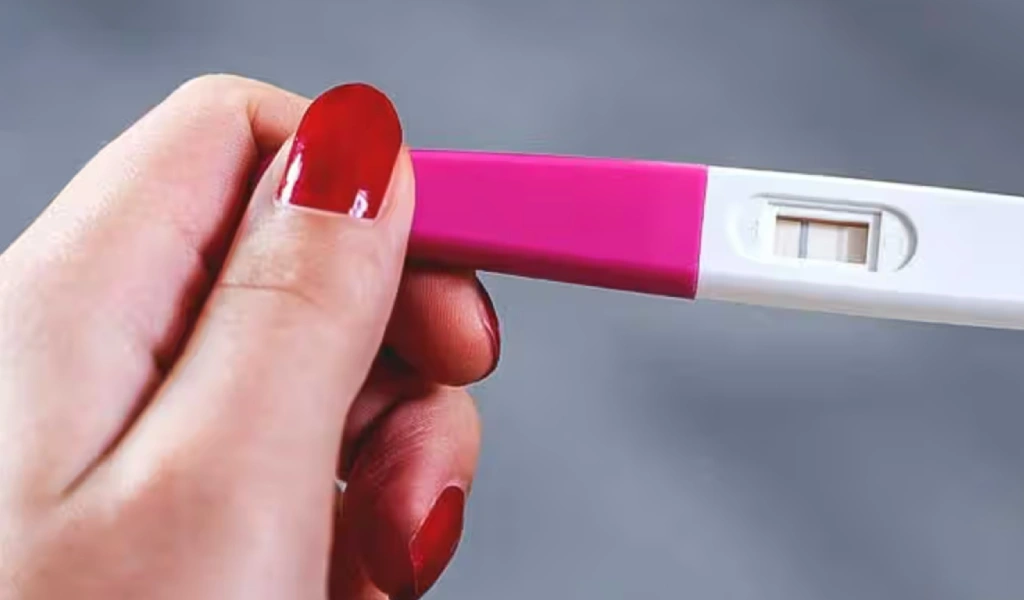Sensitive breasts, fatigue, slight bleeding, and other distinct symptoms of the early stages of pregnancy.
Many couples choose to check for pregnancy once they have missed a period, as this is typically the initial indicator of early signs of pregnancy after a missed period. A home urine pregnancy test can confirm pregnancy within a couple of days of a missed period. It is advised to take the test in the morning as hCG levels in urine may be more concentrated after a night of less urination and water intake.
If you have missed a period, then there are various potential explanations for it. If a pregnancy test yields a negative result, it is recommended to consult with a healthcare professional to pinpoint the exact underlying cause of missing a period.
Continue reading this post ‘Early Signs Of Pregnancy After Missed Period‘ to explore the probability of pregnancy after a missed period and the early signs of pregnancy.
Early Signs Of Pregnancy After Missed Period
The early signs of pregnancy after a missed period can differ from woman to woman.1
Early Symptoms And Their Timeline During Pregnancy
| SYMPTOMS | TIMELINE (WHEN IT STARTS) |
|---|---|
| Mild cramping, light spotting | Week 4 |
| Nausea | Week 5 |
| Fatigue, morning sickness, tender breasts, frequent urination | Week 6 |
| Weight gain | Week 11 |
| Pregnancy glow, acne | Week 12 |
1) Fatigue: Higher levels of progesterone can lead to fatigue. In addition, the body is working harder to accommodate the growing baby’s needs, which can result in increased tiredness.
2) Moodiness: During pregnancy, fluctuations in hormonal levels can adversely affect your mental health. It is not unusual to experience emotional instability during this period.2
3) Heartburn: The hormone progesterone relaxes the esophageal sphincter, leading to the upward flow of gastric juices into the esophagus, resulting in heartburn.
4) Bloating: An elevation in the progesterone level can lead to a decrease in the speed of digestion, resulting in gas and bloating.3
5) Tender and swollen breasts: The hormonal changes in the body can cause your breasts to feel tender and painful. As the body adapts to these changes, the discomfort should decrease within a few weeks.4
6) Light spotting: Implantation bleeding, characterized by a minor release of blood, occurs following fertilization when the embryo adheres to the uterine lining.5 Typically transpiring around 10 to 14 days (1-2 weeks) post-conception, not all pregnant individuals will experience this phenomenon.
7) Morning sickness: It can occur at any moment, whether it be day or night. Usually starting around the 6th week of the first trimester, morning sickness is often caused by hormonal fluctuations.6 The symptoms typically decrease as the pregnancy advances, with many women finding relief after the first three months.
8) Frequent urination: When the blood levels rise, the kidneys filter more fluid, resulting in more frequent urination. It is essential to inform your gynecologist about any urinary tract infections (UTIs) during early pregnancy, as they are common and require treatment.
9) Constipation: Hormonal changes can slow down the digestion process, causing food to move more slowly through the digestive system and resulting in constipation.7
10) Cramping: During the beginning days, some women may feel mild cramping in the uterus, although not all experience this symptom. Feeling a sense of heaviness in the lower abdomen is also typical.8
11) Headaches and dizziness: An increase in blood levels and hormonal fluctuations can lead to dizziness and headaches. Additionally, headaches may be accompanied by low blood sugar, dehydration, stuffy nose, and nausea.9
12) Food aversions or cravings: During pregnancy, it is normal for women to develop a dislike for specific foods and smells. Some may also experience cravings for certain foods, all of which can be attributed to the hormonal fluctuations taking place in the body.10
13) Pregnancy glow: The hormones flowing into your body cause an increase in blood volume, leading to improved circulation and brighter skin. Additionally, these hormones stimulate the skin glands to produce more oil, resulting in a shinier appearance.11
14) Faster heartbeat: With the rising need for oxygen and nutrients, the heart must exert more effort to supply additional blood to the fetus. This leads to an elevation in heart rate.
15) Metallic taste: During the early stages of pregnancy, hormonal fluctuations can cause a decrease in taste sensation. However, once hormone levels return to normal, taste perception typically returns to normal as well.
16) Breathlessness: Breathlessness can occur in early pregnancy due to physiological changes in the body, like hormonal fluctuations. The increase in progesterone production may impact the respiratory system.12 This rise in progesterone levels could lead to expectant women experiencing breathlessness and increased respiration rates.
17) Nasal congestion: A rise in blood levels can result in the enlargement of nasal membranes, allowing for increased mucus flow and ultimately causing nasal congestion. The swelling of the membranes may also result in nosebleeds.
18) Lower backache: In the early stages of pregnancy, some women may feel lower back pain. However, this discomfort becomes more noticeable as the pregnancy progresses.13
19) Acne: As hormonal levels rise, the amount of androgen in the body also increases.14 This leads to the sebaceous glands producing more oils that can block the pores, creating an environment for bacteria to thrive and ultimately causing acne to develop.
20) Excess saliva: Excessive saliva, also called ptyalism or hypersalivation, is when your mouth produces more saliva than usual, sometimes up to one to two liters per day. Too much saliva in the beginning stages of pregnancy may result from hormonal shifts or nausea.
Although not everyone experiences this, some expectant mothers might observe an increase in their saliva production by the 8th week of pregnancy.
While these signs suggest a potential pregnancy, they are not conclusive. The most accurate way to confirm pregnancy is through a pregnancy test.
When is the best time to do a pregnancy test?
The ideal moment to conduct a pregnancy test is following a missed period, generally within four to five days of its expected onset.
It is recommended to utilize a home pregnancy kit with the initial sample of urine in the morning.
Occasionally, the body may generate insufficient levels of hCG, potentially rendering it undetectable by a home pregnancy test. Conversely, a blood test is capable of accurately identifying even the most minute concentrations of hCG within the body.
If you are thinking about taking a pregnancy test, it’s best to wait until after you have missed a period to ensure an accurate result.
Detecting the early signs of pregnancy is typically straightforward. Many women conduct a pregnancy test following a missed period, which is the initial indication.
While pregnancy can be a thrilling time, the symptoms can also be bothersome and challenging, particularly in the beginning. These symptoms consist of heartburn, constipation, bloating, lower back pain, and skin breakouts.
Luckily, these symptoms will diminish as your hormone levels stabilize. Nevertheless, being aware of these various symptoms can assist in remaining calm when they emerge and sustaining a peaceful state of mind.
Key Pointers of ‘Early Signs Of Pregnancy After Missed Period’
- Urine tests done at home can be reliable for detecting pregnancy a few days after a woman has missed a period.
- Early signs of pregnancy can consist of fatigue, breast soreness, heartburn, nausea, and mood changes, but these indicators can differ significantly from woman to woman.
- Implantation bleeding can present as a small amount of spotting around four weeks after conception.
- Pregnancy glow and acne can start to become noticeable around the 12th week of pregnancy.
- Hormonal fluctuations can also lead to digestive problems, changes in taste preferences, and strong desires for specific foods.
- Consulting a doctor for a precise diagnosis is necessary when negative test results suggest other reasons for a missed period.


























